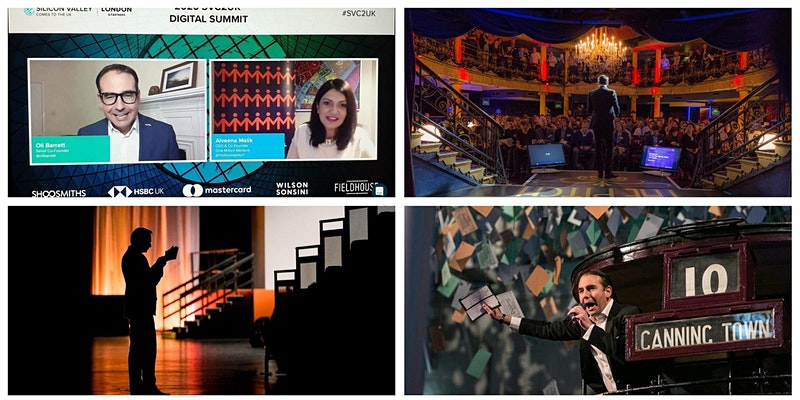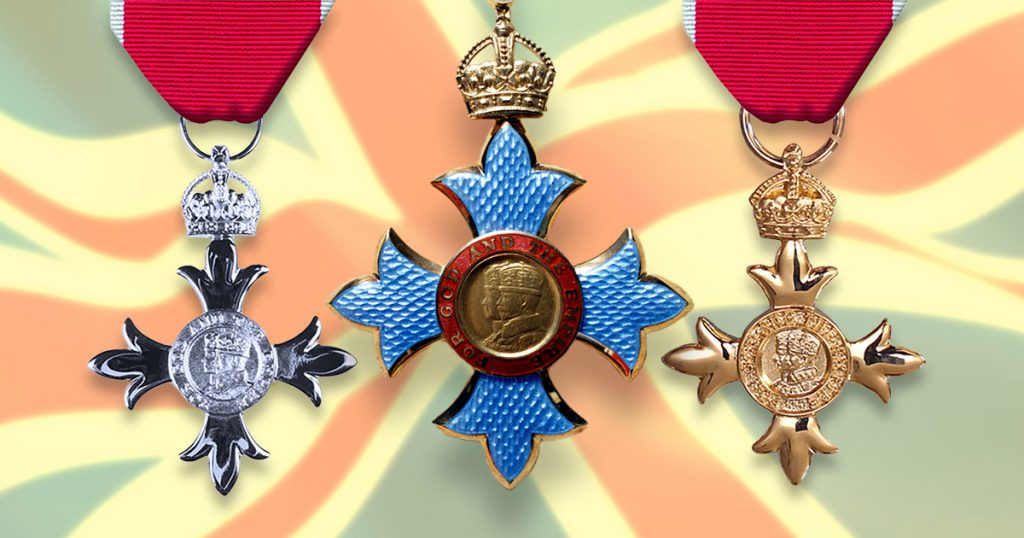How to MC, compère, or chair events
I’m often asked for my top tips for hosting events and I’ve tended to share them privately over email and in conversation. Until now.
Presenting and chairing is something I love doing, and I want to see far more people from all backgrounds stepping up, and sharing the microphone.
In the past few years, I’ve been lucky to host for an incredible range of organisations including the Great British Entrepreneur Awards, The Times, the London Business Awards, Silicon Valley Comes to the UK, London Tech Week, the ScaleUp Institute, Young Enterprise, Business in the Community, Elite Business Live, Ambition Nation, Tech London Advocates, and dozens more. I’ve also worked alongside some world-class agencies including Forgather and Seven Hills.
Hosting allows you to meet some amazing individuals, to help other people and to attract opportunities. It also helps you to give a voice to people who might otherwise have been unheard.
This article is a collection of some of my top tips. They are all gained from personal experience and are not intended to be definitive.
The Big Question;
When preparing to host an event, ask the team;
“Apart from saying “that was excellent – what do we want the guests to feel, say and do when the event is over?”
Your Role as Host;
1) Get to the WHY of the gathering, from the perspective of the organiser and the audience member. Why does this gathering matter and what is it really about? Ask;
Why does this gathering matter and what is it really about?
2) Make guests and audience members feel comfortable, which in turn will lead to better contributions.
3) Where needed, shift the mood of the room.
The last one of these especially will involve your own energy and persona. You don’t need to become someone different on stage, however you could think about which of your traits and characteristics you might like to amplify or exaggerate. There is no “single” persona for a great host, and you should make the role your own.
Thinking more about your role as host;
4) Explore your opportunity to shape the agenda, design and casting of the event. For several years, for example, I have had a rule of refusing to chair all-male panels (manels) and I’m happy to suggest women contributors if helpful.
As a host, you may not have “hard power” however you will almost always have the ability and the potential to influence.
Tips on Preparation;
1) Work out which sort of brief will suit you best. Is it a full script or a list of bullet points? Work with an organiser to help them to help you.
2) Within any brief, make sure you have a clear one-page running order.
3) Don’t be afraid to ask for a guest list (without email addresses) so you know who is in the room.
4) Make sure you know who, on the day, will be calling the shots. Who is your main point of contact for timings, cues and updates? This will often be different to the person who led on the planning or design of the event.
On Preparing to Interview Guests;
1) Deep dive into each guest using Twitter, LinkedIn and especially YouTube. Use more recent Google searches to find fresher stories and insights.
Deep and thorough background reading helps you to build great conversations and, crucially, rapport on the day.
2) Seek clarity early on about your role (if any) on question creation. Will questions be given to you, will you have to create them or can you co-create them with the organiser?
3) Who will brief the guests? I prefer all logistics to be briefed by the organiser and rely on pre-event briefings, where helpful, to reassure and build chemistry among a small group.
4) Don’t have your best conversation on the pre-call.
5) Consider the arc of the conversation and know that, despite possible tangents, you can return to a place on that arc.
6) Request support in sitting guests in the order they appear in your script. This will set your mind at ease, especially when meeting people for the first time.
7) Write the guests’ names multiple times throughout your script to continually remind you of who is where.
8) Consider using shareable documents before the event to avoid multiple plans flying around.
9) I use cards on the day because it makes it easier to write “off the cuff” notes.
10) Consider in advance which questions you might ask to each guest, to specific guests, and ones which you might offer up for anyone to answer. Mark your cards up accordingly.
Top tips for MCing events;
1) Find out who will be introducing you (if anyone) and how. Don’t be afraid to send a couple of lines on how you’d like to be introduced.
2) Recognise or call out certain people and organisations in the audience.
3) Show that you are genuinely looking forward to what’s to come.
4) Don’t over-introduce your guests (“this next guest is one of the funniest speakers I have ever seen”).
5) Ending a great introduction with the name of the speaker can keep things upbeat and crisp; (“please welcome, Chief Executive of Young Enterprise, Sharon Davies”).
Top Tips for Virtual Events;
1) See the platform before the event.
2) Be prepared to step in or “pick up” any panel at any point due to a technical glitch or a guest disappearing.
3) Don’t be afraid to channel the audience and say what you see on technical glitches (“I’m not sure we can hear you John”).
4) Encourage guest contribution across platforms, not just on the event platform.
5) Use a decent mic (I use the Yeti Blue) and ring light.
6) Have your camera at eye level, not looking up at you.
7) Channel the organiser when thanking guests backstage before and afterwards as you may be one of the few people they interact with on the day.
8) Agree whether, if timings slip, you’ll get back on the clock (next session starts at the original time) or whether the overall timings can slip.
Top Tips for In-Person Events
1) Treat everyone (and especially the crew) as a VVIP.
2) See the space as soon as possible and see the stage from the back of the room to give you an impression of what it will take to “hit the back” and connect with the whole room.
3) Meet “Mr Grumpy”, the grumpiest looking person in the room, who always turns out to be lovely. This will set your mind at rest about any negative energy in the space.
4) Consider a new pair of shoes or new shirt to help you feel great on the day. If wearing new shoes, consider wearing two pairs of socks!
Top Tips on Hosting Technique
1) Create the structures which you can then riff around.
2) Don’t be afraid to mix it up – on pace, on who gets which questions, on which order you ask.
3) Do everything in your power to make your guests feel comfortable.
4) Listen, listen listen. The best insights on the day are just as likely to be triggered by a spontaneous follow up of question on the day, rather than by something you’ve prepared in advance.
5) The first answer you get will often not be particularly good or clear. Don’t move on. Ask them for more. Ask them to bring what they’ve said to life with an example. Take a moment to help the guest build on what they have said.
6) Blend questions to all with questions to individuals and questions which guests can offer to answer. Don’t feel the need to ask every guest every question.
7) Think carefully about getting questions from a diverse range of guests and bear in mind that if a woman asks the first question, for example, it is far more likely that more women will contribute to the conversation.
8) Channel the audience and don’t be afraid to gently push back on a guest’s opinion or perspective, giving an alternative view. Likewise, don’t be afraid to ask for clarification, especially on acronyms or “jargon”.
9) When asking the audience for questions, don’t be afraid to wait 30 seconds or more for them to emerge. Silence doesn’t mean there are no questions.
10) Don’t be afraid to bring questions in early in a session, knowing that you can go back to the flow whenever you want.
Hopefully that’s a useful bundle of tips and techniques.
In terms of broader reflections;
1) Practice, whenever you can.
2) Offer to host.
3) Share your hosting ambitions with trusted friends and colleagues to plant a seed and help them to help you.
4) “Mark a few cards”, by telling people that you would like to work with them.
5) Get feedback and ask three times. Only when you’ve asked three times can you move past the “you were great”, past “there were several good things” and onto what you really need to know to improve.
6) Consider getting a speaking coach (Alex Merry, Edie Lush, Katie Ledger, David McQueen are all excellent) or working with an agency like Missing Link.
On Breaking In;
1) Look for events with MCs which may need chairs for certain sections.
2) Many events may benefit from an external MC, to bring additional professionalism or perspective. Look for these.
2) Look for events with numerous chairs which may lack an overall MC to create and provide the “Golden Thread” through an event.
3) Create your own gathering (large or small) and cast yourself in a hosting role.
4) Consider giving your time, especially to support a cause you care about.
Hosting an event is a privilege. It can be hugely rewarding and enormous fun. I’d like to see a far wider array of hosts from a far wider range of backgrounds.
I would not have picked up any of these tips if it hadn’t been for the people (many of whom I now call friends) and organisations who have trusted me to host for them. To them I am hugely grateful.
If you have found this article useful them please consider sharing it either by email, on Twitter (@OliBarrett) or on LinkedIn.





